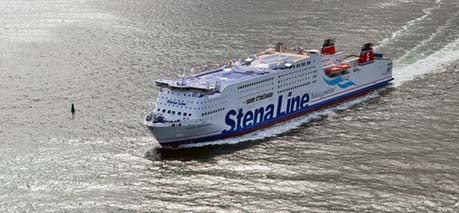
 Ferry company Stena Line has announced that it will run the world’s first ship powered by methanol in order to reduce emissions The company, in co-operation with engine manufacturer Wärtsilä and methanol producer and supplier Methanex Corporation, will convert the 1,500 passenger, 240 m long STENA GERMANICA to methanol propulsion by early 2015. The ship will run, as it currently does, between Gothenburg in Sweden and Kiel in Germany.
Ferry company Stena Line has announced that it will run the world’s first ship powered by methanol in order to reduce emissions The company, in co-operation with engine manufacturer Wärtsilä and methanol producer and supplier Methanex Corporation, will convert the 1,500 passenger, 240 m long STENA GERMANICA to methanol propulsion by early 2015. The ship will run, as it currently does, between Gothenburg in Sweden and Kiel in Germany.
The conversion works, which are expected to take six weeks and cost €22m (US$28m), will take place at Remontowa shipyard in Poland in January 2015.The project will be financially supported by the European Union’s “motorways of the seas” initiative. Stena Line CEO Carl-Johan Hagman said: “We are constantly evaluating different fuels for the future and to be first in the world with a methanol conversion is a big step towards sustainable transportation.” The engine will be ‘dual fuel’, using methanol as the vessel’s main fuel grade but with the ability to use Marine Gas Oil as backup. Methanol is a clear, colorless biodegradable fuel that can be produced from natural gas, coal, “biomass” or even carbon dioxide.
The company said in a statement that by using methanol, the emissions of sulphur (SOx) will be reduced about 99%, nitrogen (NOx) 60%, particles (PM) 95% and carbon dioxide (CO2) 25% compared with today’s fuel. From early 2015, vessels in the area around the Baltic and North Sea, known as the SECA area, will have to use fuel with very low sulphur content of 0.1% (today the fuel restriction is 1.0%).
According to Stena Line, the most common is MGO which will be about 40-50% higher in price than HFO (heavy fuel oil) which is being used today.In parallel with the change to low-sulphur oils, Stena Line said it is running a number of projects to look at other alternative fuels and different techniques for emission purification such as LNG, electric propulsion and scrubbers.
“Due to our size we have a broad perspective on handling the new sulphur regulations and it is likely we will use some different types of solutions in the coming years. However, based on the results of the methanol project we are intending to convert additional ferries, says Stena Line CEO Carl-Johan Hagman.He continued: “Naturally, adapting and converting Stena Lines fleet of some 40 ferries to the new regulations in the near future is a very tough task which will both take time, effort and money. The company said that methanol’s emissions are similar to using LNG but the need for infrastructure is much less and handling is simpler.
Source: container.mag












